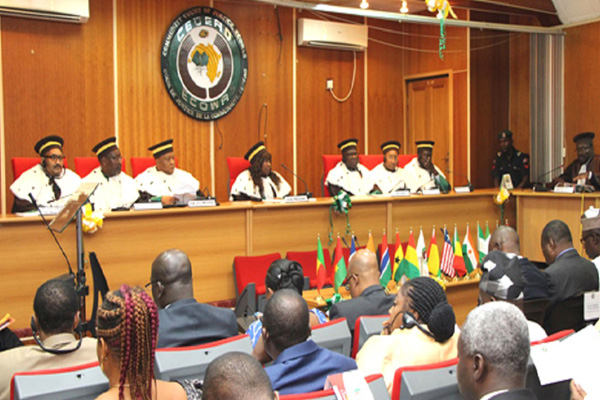Following the decision of the ECOWAS Community Court of Justice of 13 March 2012 to adjourn the hearing of the case, RADDHO v Senegal, Case No. ECW/CCJ/APP/03/12, the Court proceeded to hear the matter on 4 May 2012.
The Republic of Senegal was represented by their Counsel, Mr Mafall Fall, while RADDHO’s Chairperson, Alioune Tine and RADDHO’s lawyer, Maître Amadou Kane were also present.
The Centre for Human Rights, which has been the legal and technical adviser of RADDHO in this matter, was represented by Mr Horace Adjolohoun who also acted as lead counsel in this session of the hearing.
During the hearing, Counsel for Senegal raised a preliminary objection contending that RADDHO, as a non-governmental organisation, does not have right and locus standi to bring a matter before the Court. He based his contention on the provisions of article 10 of the 2005 ECOWAS Court Supplementary Protocol which provides that access to the Court is only to member states and community organs for states’ failure to abide by community obligations; and individuals seeking relief for violation of their human rights. In support of this argument, Senegal argued that RADDHO cannot sustain an action before the ECOWAS Court unless it has personally suffered some injury; in the absence of which RADDHO had no justiciable ground to invoke the jurisdiction of the Court and that the Court should therefore not proceed to hear the merits of the matter.
In response to the objection raised by Senegal, Mr Horace Adjolohoun, pleading on behalf of RADDHO, duly submitted before the Court that RADDHO does indeed have standing based on the doctrine of ‘Actio Popularis’. Mr Adjolohoun proceeded to cite numerous well established precedents of the ECOWAS Court with regard to the question of the place of NGO’s in bringing matters before the Court.
Towards this end, Mr Adjolohoun cited the landmark cases of SERAP v The Federal Republic of Nigeria, Media Foundation for West Africa v The Gambia as well as National Coordination of Departmental Delegates of the Cocoa Coffee Sector (CNDD) v Republic of Cote d’Ivoire. It was RADDHO’s submission that all the above cases were entertained and determined by the ECOWAS Court from non-governmental organisations based on the doctrine of ‘actio popularis’ in a liberal construction of the relevant provisions of article 10 of the Supplementary Protocol.
The doctrine of ‘actio popularis’ as was described by the ECOWAS Court in the SERAP case of 2009 refers to an action brought by a person or a group to obtain a remedy in the name of the collective interest. Courts have held that this doctrine acts as an essential safeguard for the performance of the mandates given to states such that individuals or groups within a state are given the right to take legal action to protect and enforce a public duty regardless of not meeting the ‘sufficient interest or direct injury’ tests.
Towards this end, the Centre for Human Rights holds that Senegal’s argument with respect to locus standi is based on a restrictive and outdated interpretation of standing, particularly in human rights matters. The modern trend in international jurisprudence is gradually shifting towards a more flexible and progressive interpretation of the doctrine of standing for human rights matters. A flexible approach in the interpretation of the doctrine of standing allows any citizen to challenge a breach of a public right in court.
The Centre for Human Rights further asserts that RADDHO’s aims as enunciated through its work are to defend and protect the rights of citizens in Senegal and Africa at large. RADDHO’s claim is therefore based on the right of the NGO, as part of the larger Senegalese and ECOWAS community to be able to demand from the Republic of Senegal the rights enshrined in Senegal’s Constitution as well as the legal entitlements enshrined in the ECOWAS Protocol on Democracy and Good Governance and the African Charter. RADDHO thus seeks to enforce a public right, for which it has the requisite standing to maintain the action.
It is anticipated that come 11 June 2012, the ECOWAS Court will be able to give a positive ruling to this preliminary objection, particularly in consideration of its previous precedent-setting record with regards to similar issues of NGO standing.
For further information, please contact:
Prof Frans Viljoen,
Director, Centre for Human Rights
Tel: +27 (0) 12 420 3228
Or Mr. Horace Adjolohoun,
Centre for Human Rights, Faculty of Law, University of Pretoria
Tel: +27 (0) 12 420 3151
Fax: +27 (0) 86 580 5743
Email: horace.adjolohoun@up.ac.za


